187 books about Volume 2 and 9
start with E
187 books about Volume 2 and 9
187 books about Volume 2
9 start with E start with E
9 start with E start with E
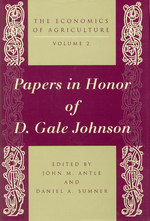
The Economics of Agriculture, Volume 2
Papers in Honor of D. Gale Johnson
Edited by John M. Antle and Daniel A. Sumner
University of Chicago Press, 1995
D. Gale Johnson, one of the world's foremost agricultural economists, has over the last five decades changed the conduct of research on agricultural economics and policy. The papers brought together in The Economics of Agriculture reveal the breadth and depth of his influence on the creation of modern agricultural economics.
Volume 1 collects for the first time in one source Johnson's most important work. These classic papers explore the consequences of government intervention in United States and world agriculture; the economics of agricultural supply and of rural labor and human capital issues; and the analysis of agricultural productivity in poor countries, including the centrally planned economies of China and Eastern Europe. Models of precise reasoning and powerful empirical research, the papers cover a wide range of topics—from U.S. commodity price policy to the economics of population control and farm policy reform in China. Volume 1 includes a definitive bibliography of Johnson's published writings.
Volume 2 presents twenty-two papers by Johnson's former students and colleagues. International in scope, these papers explore themes and topics inspired by Johnson's work, including agricultural policy and U.S. farm prices; European Common Agricultural Policy; and agricultural and rural development in the Third World. Contributors to Volume 2 are David G. Abler, John M. Antle, Richard R. Barichello, Andrew P. Barkley, Karen Brooks, David S. Bullock, Robert E. Evenson, B. Delworth Gardner, Bruce L. Gardner, Dale M. Hoover, Wallace E. Huffman, Paul R. Johnson, Yoav Kislev, Justin Yifu Lin, Yair Mundlak, John Nash, Keijuro Otsuka, Willis Peterson, Todd E. Petzel, Vernon W. Ruttan, Maurice Schiff, G. Edward Schuh, Theodore W. Schultz, James Snyder, Vasant Sukhatme, Daniel A. Sumner, Vinod Thomas, George Tolley, and Alberto Valdes.
Volume 1 collects for the first time in one source Johnson's most important work. These classic papers explore the consequences of government intervention in United States and world agriculture; the economics of agricultural supply and of rural labor and human capital issues; and the analysis of agricultural productivity in poor countries, including the centrally planned economies of China and Eastern Europe. Models of precise reasoning and powerful empirical research, the papers cover a wide range of topics—from U.S. commodity price policy to the economics of population control and farm policy reform in China. Volume 1 includes a definitive bibliography of Johnson's published writings.
Volume 2 presents twenty-two papers by Johnson's former students and colleagues. International in scope, these papers explore themes and topics inspired by Johnson's work, including agricultural policy and U.S. farm prices; European Common Agricultural Policy; and agricultural and rural development in the Third World. Contributors to Volume 2 are David G. Abler, John M. Antle, Richard R. Barichello, Andrew P. Barkley, Karen Brooks, David S. Bullock, Robert E. Evenson, B. Delworth Gardner, Bruce L. Gardner, Dale M. Hoover, Wallace E. Huffman, Paul R. Johnson, Yoav Kislev, Justin Yifu Lin, Yair Mundlak, John Nash, Keijuro Otsuka, Willis Peterson, Todd E. Petzel, Vernon W. Ruttan, Maurice Schiff, G. Edward Schuh, Theodore W. Schultz, James Snyder, Vasant Sukhatme, Daniel A. Sumner, Vinod Thomas, George Tolley, and Alberto Valdes.
[more]

Electrical Craft Principles, Volume 2
John Whitfield
The Institution of Engineering and Technology, 2009
This is the second of a two-volume work covering the electrical principles syllabuses of all of the major examining bodies including the City & Guilds of London Institute's electrical craft courses. It is also suitable for a wide range of other courses, including the first three years of the BTEC electrical series. Great care has been taken to ensure that the text fully covers the content of the syllabuses concerned, both as published and as interpreted by the examiners in the past.
[more]

Electrical Steels
Performance and applications, Volume 2
Anthony Moses
The Institution of Engineering and Technology, 2019
Electrical steels are critical components of magnetic cores used in applications ranging from large rotating machines, including energy generating equipment, and transformers to small instrument transformers and harmonic filters. Presented over two volumes, this comprehensive handbook provides full coverage of the state-of-the-art in electrical steels.
[more]
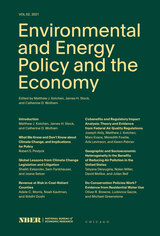
Environmental and Energy Policy and the Economy
Volume 2
Edited by Matthew J. Kotchen, James H. Stock, and Catherine D. Wolfram
University of Chicago Press Journals, 2020
This volume presents six new papers on environmental and energy economics and related policy issues. Robert Pindyck provides a systematic overview of what is known, and remains unknown, about climate change, along with the implications of uncertainty for climate policy. Shaikh Eskander, Sam Fankhauser, and Joana Setzer offer insights from a comprehensive data set on climate change legislation and litigation across all countries of the world over the past thirty years. Adele Morris, Noah Kaufman, and Siddhi Doshi shine a light on how expected trends in the coal industry will create significant challenges for the local public finance of coal-reliant communities. Joseph Aldy and his collaborators analyze the treatment of co-benefits in benefit-cost analyses of federal clean air regulations. Tatyana Deryugina and her co-authors report on the geographic and socioeconomic heterogeneity in the benefits of reducing particulate matter air pollution. Finally, Oliver Browne, Ludovica Gazze, and Michael Greenstone use detailed data on residential water consumption to evaluate the relative impacts of conservation policies based on prices, restrictions, and public persuasion.
[more]
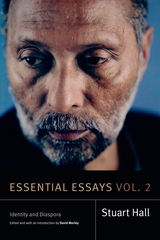
Essential Essays, Volume 2
Identity and Diaspora
Stuart Hall
Duke University Press, 2018
From his arrival in Britain in the 1950s and involvement in the New Left, to founding the field of cultural studies and examining race and identity in the 1990s and early 2000s, Stuart Hall has been central to shaping many of the cultural and political debates of our time. Essential Essays—a landmark two-volume set—brings together Stuart Hall's most influential and foundational works. Spanning the whole of his career, these volumes reflect the breadth and depth of his intellectual and political projects while demonstrating their continued vitality and importance.
Volume 2: Identity and Diaspora draws from Hall's later essays, in which he investigated questions of colonialism, empire, and race. It opens with “Gramsci's Relevance for the Study of Race and Ethnicity,” which frames the volume and finds Hall rethinking received notions of racial essentialism. In addition to essays on multiculturalism and globalization, black popular culture, and Western modernity's racial underpinnings, Volume 2 contains three interviews with Hall, in which he reflects on his life to theorize his identity as a colonial and diasporic subject.
Volume 2: Identity and Diaspora draws from Hall's later essays, in which he investigated questions of colonialism, empire, and race. It opens with “Gramsci's Relevance for the Study of Race and Ethnicity,” which frames the volume and finds Hall rethinking received notions of racial essentialism. In addition to essays on multiculturalism and globalization, black popular culture, and Western modernity's racial underpinnings, Volume 2 contains three interviews with Hall, in which he reflects on his life to theorize his identity as a colonial and diasporic subject.
[more]
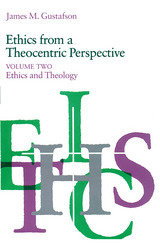
Ethics from a Theocentric Perspective, Volume 2
Ethics and Theology
James M. Gustafson
University of Chicago Press, 1984
Gustafson's two-volume work has been hailed as a major contribution to Christian ethics. In this second volume, Gustafson considers marriage, suicide, and the allocation of resources in famine and in biomedical research to develop an ethical outlook in which divine purpose is the basis of moral activity.
"Breadth and subtlety, wisdom and insight . . . Gustafson is a first-rate theologian."—Commonweal
"The two-volume work, now complete, will be a benchmark for discussions of Christian ethics for years to come. With it Gustafson becomes one of the thinkers by whom others can, by agreement or divergence, define their own ethics."—Roger L. Shinn, Christianity and Crisis
"Gustafson's theocentrism is an original and creative contribution to modern ethical discussion."—Douglas Sturm, Ethics
"Breadth and subtlety, wisdom and insight . . . Gustafson is a first-rate theologian."—Commonweal
"The two-volume work, now complete, will be a benchmark for discussions of Christian ethics for years to come. With it Gustafson becomes one of the thinkers by whom others can, by agreement or divergence, define their own ethics."—Roger L. Shinn, Christianity and Crisis
"Gustafson's theocentrism is an original and creative contribution to modern ethical discussion."—Douglas Sturm, Ethics
[more]
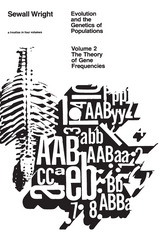
Evolution and the Genetics of Populations, Volume 2
Theory of Gene Frequencies
Sewall Wright
University of Chicago Press, 1969
"Wright's views about population genetics and evolution are so fundamental and so comprehensive that every serious student must examine these books firsthand. . . . Publication of this treatise is a major event in evolutionary biology."-Daniel L. Hartl, BioScience
[more]

Exegetical Epistles, Volume 2
Thomas P. St. Jerome
Catholic University of America Press, 2024
This is the second of a two-volume set that includes Thomas Scheck’s new translations of several of St. Jerome’s previously untranslated exegetical letters. Epistle 85 to St. Paulinus of Nola contains Jerome’s answers to two questions: how Exodus 7.13 and Romans 9.16 can be reconciled with free will, and what 1 Corinthians 7.14 means. Epistle 106 to Sunnias and Fretela, which deals with textual criticism of the Septuagint, consists of a meticulous defense of Jerome’s new translation of the Latin Psalter. Epistle 112 is a response to three letters from St. Augustine: Ep. 56 (contained in the previous volume), Ep. 67, and Ep 104. In the face of Augustine’s criticisms, Jerome defends his own endeavor to translate the Old Testament directly from the
Hebrew text. He also vindicates his own ecclesiastical interpretation of Galatians 2.4-11, as he had set this forth in his Commentary on Galatians, and along the way he accuses Augustine of advocating the heresy of Judaizing. Epistle 119 to Minervius and Alexander contains Jerome’s answers to some eschatological questions regarding the interpretation of 1 Corinthians 15.51 and 1 Thessalonians 4.17. In Epistle 120 to Hedibia, Jerome tackles twelve exegetical questions that focus on reconciling the discrepant Resurrection accounts in the Gospels, as well as questions about Romans 9.14-29, 2 Corinthians 2.16, and 1 Thessalonians 5.23. In Epistle 121 to Algasia, Jerome clarifies eleven exegetical questions dealing with passages in the Gospels and Paul’s letters (Romans 5.7; 7.7-25; 9.3-5; Colossians 2.18-19; 2 Thessalonians 2.3). This letter also contains an exposition of the parable of the unjust steward (Luke 16.1-10), in which Jerome translates material from a commentary attributed to Theophilus of Antioch. In Epistle 129 to
Dardanus, Jerome interprets “the promised land” and discusses the alleged crimes of the Jews. Epistle 130 to Demetrias is not an exegetical letter but an exhortation to the newly consecrated virgin on how to live out her vocation. In this letter Jerome reflects on Origenism and Pelagianism. Finally, in Epistle 140 to Cyprian the presbyter, Jerome expounds Psalm 90.
[more]
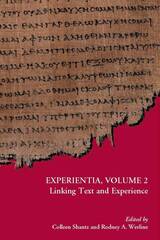
Experientia, Volume 2
Linking Text and Experience
Colleen Shantz
SBL Press, 2012
This collection of essays continues the investigation of religious experience in early Judaism and early Christianity begun in Experientia, Volume 1, by addressing one of the traditional objections to the study of experience in antiquity. The authors address the relationship between the surviving evidence, which is textual, and the religious experiences that precede or ensue from those texts. Drawing on insights from anthropology, sociology, social memory theory, neuroscience, and cognitive science, they explore a range of religious phenomena including worship, the act of public reading, ritual, ecstasy, mystical ascent, and the transformation of gender and of emotions. Through careful and theoretically informed work, the authors demonstrate the possibility of moving from written documents to assess the lived experiences that are linked to them. The contributors are István Czachesz, Frances Flannery, Robin Griffith-Jones, Angela Kim Harkins, Bert Jan Lietaert Peerbolte, John R. Levison, Carol A. Newsom, Rollin A. Ramsaran, Colleen Shantz, Leif E. Vaage, and Rodney A. Werline.
[more]
READERS
Browse our collection.
PUBLISHERS
See BiblioVault's publisher services.
STUDENT SERVICES
Files for college accessibility offices.
UChicago Accessibility Resources
home | accessibility | search | about | contact us
BiblioVault ® 2001 - 2024
The University of Chicago Press









